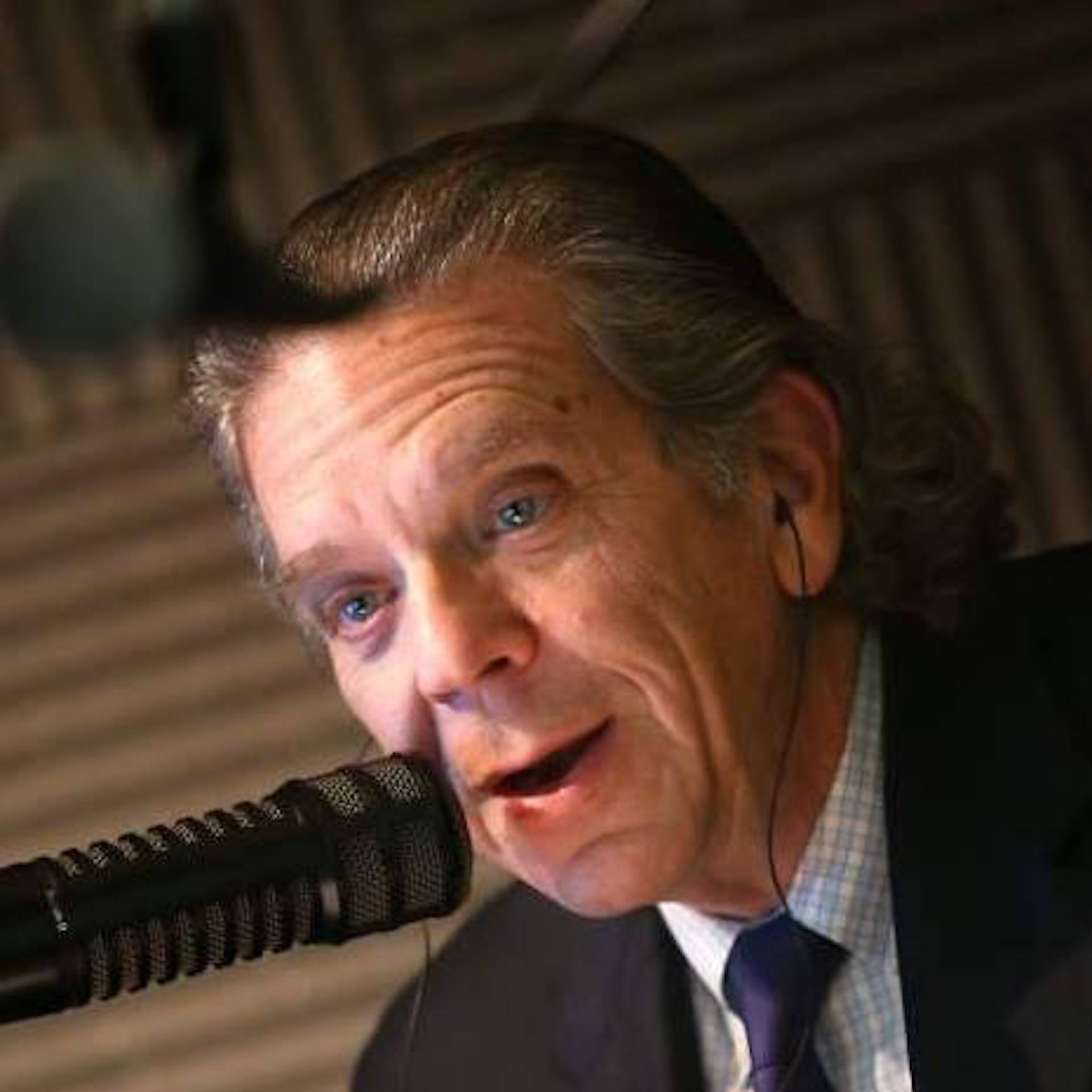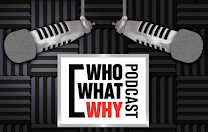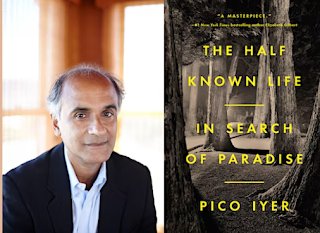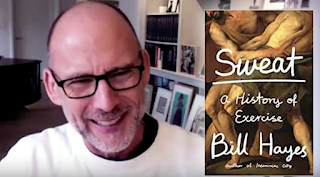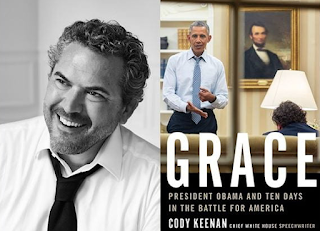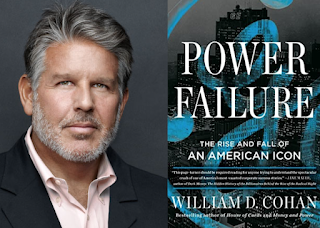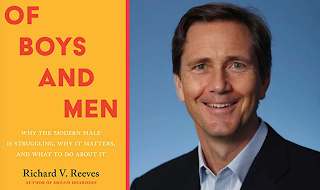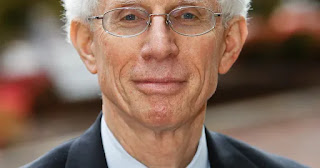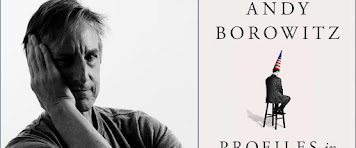Episodes
Tuesday Mar 14, 2023
Spies in Hollywood: A conversation with Jonathan Gill
Tuesday Mar 14, 2023
Tuesday Mar 14, 2023
The hacking of Sony Pictures back in 2014, by North Korea, made us all wonder about spies in Hollywood. Today, our paranoia tells us that the Chinese have spies everywhere. If they are checking on TikTok, they must be in Hollywood?
Well, during the Cold War, it turns out the studios were infiltrated with spies. One of those was a producer/director turned double agent named Boris Morros, and Jonathan Gill tells his story in Hollywood Double Agent: The True Tale of Boris Morros, Film Producer Turned Cold War Spy.
My conversation with Jonathan Gill:
Thursday Feb 23, 2023
Thursday Feb 23, 2023
The ever-evolving landscape of business, finance, entertainment, and medicine is often shaped by technological advancements and cultural changes. However, those in power during these changes often resist them and try to maintain their grip on the status quo, particularly if family is involved. This is exemplified in the TV show "Succession" and James B. Stewart's books, including "Disney Wars," "Den of Thieves," "Deep State," "Tangled Webs," and "Blood Sport."
The pandemic was a transformational event for the entertainment industry, but the #MeToo movement was also a catalyst for change, with Harvey Weinstein as its poster child. Additionally, the theatrical movie business faced pressure from the ongoing streaming wars, which have altered the fabric of Hollywood.
All of these forces come together in the story of Sumner Redstone, his family, and his mistresses. Redstone was a one-time movie theater magnate and the owner of Paramount, Viacom, CBS, and Simon and Schuster. In his 90s, he was surrounded by hangers-on, adversaries, family members, and a group of women whose experiences highlighted the worst of Hollywood, even in modern times. When you add the worst of corporate governance to the mix, you have the story that James B. Stewart and Rachel Abrams tell in "
Monday Feb 20, 2023
Why Doesn’t Our Technology Live Up to Our Science Fiction?
Monday Feb 20, 2023
Monday Feb 20, 2023
J. Storrs Hall, author and futurist, who discusses why the promised technological advancements of the 1960s have yet to materialize.
He argues that future exponential growth and technological progress must be powered by advancements in nanotechnology, biotechnology, AI, and nuclear power, and issues a call to action for a future that matches the ambitious visions of 1960s science fiction writers.
Monday Feb 13, 2023
Monday Feb 13, 2023
Joe Biden is the oldest President to take office in the past 234 years. He has a long public life, and has grown into the person and politician he is today. Biden was seen as the perfect antidote to Trump, but it is still uncertain if his preference for “normalcy” will enable him to be the 21st century President we need. Chris Whipple's new book, "The Fight of His Life: Inside Joe Biden's White House," explores this and more.
My conversation with Chris Whipple:
Thursday Feb 09, 2023
We Have No Democracy Without Good Citizens: My conversation with Richard Haass
Thursday Feb 09, 2023
Thursday Feb 09, 2023
A recent Gallup survey of American concerns showed that foreign policy is nearly at the bottom of the list, with inflation and prices near the top. Other high-ranking topics include the economy in general, immigration, crime and violence, race, the environment, and, topping the list, the proper role of government.
The fact is that none of these problems can be solved without a thriving, healthy democracy to address their root causes and work together to find bipartisan solutions.
That's why it becomes clear that our collective angst about all of these issues is really about whether we have a strong enough democracy, both locally and nationally, to solve anything.
Maybe that's why one of our most distinguished foreign policy experts has turned his attention inward, from understanding the world to trying to better understand the future of our place in it.
Richard Haass takes all this on in his new book, The Bill of Obligations: The ten habits of good citizens.
My conversation with Richard Haass
Tuesday Jan 31, 2023
We each have the personal answer to our divisions: A Conversation with Pico Iyer
Tuesday Jan 31, 2023
Tuesday Jan 31, 2023
Division and conflict have been the default setting for civilization. It’s what wars, shifting alliances and even relational conflict is all about. So why, even after thousands of years of evolution, of death and recrimination and unhappiness, is this still true?
Perhaps the answer lies in our human desire to try and understand to make sense of the world. In science or mathematics, there is often one right answer.
In man's understanding of the world and of each other, that does not happen. So we strive, we seek and we hope to find peace. To come to terms with some answer that explains it all. But life, physical and spiritual and even social and political is not like physics. There is no one answer
This is where I begin my conversation with Pico Iyer.
Thursday Jan 26, 2023
Citizenship Is Just A Commodity: A Conversation with Atossa Abrahamian
Thursday Jan 26, 2023
Thursday Jan 26, 2023
Citizenship used to be a cherished status, taken seriously by those who held it. But in today’s globalized world, it has become a commodity that can be bought and sold.
In this week’s WhoWhatWhy podcast, journalist Atossa Abrahamian, senior editor of The Nation and author of the 2015 book The Cosmopolites, delves into the world of “global citizens.”
She explains how multiple passports are becoming more popular as a status symbol, and a plan B for those who want to live in several countries. Some nations are turning citizenship into a business, selling economic citizenship (tax havens) as a product, and offering citizenship to the wealthy, while making it more difficult for the poor to obtain it.
Abrahamian warns that this commodification of citizenship may weaken its value and lead to criminal dangers.
My WhoWhatWhy conversation with Atossa Abrahamian
Friday Jan 13, 2023
Friday Jan 13, 2023
In spite of deregulation, airline and air traffic control systems in need of updates, pilot shortages, airport overcrowding and even a pandemic, flying has never been safer.
What’s the secret sauce that makes this the case? Why, when safety in other industries from hospitals to construction to automobiles, seems so difficult to achieve, how has the airline industry been so successful and what can we all learn from their efforts?
I explore this with John Nance. John has written about all of these issues in his non fiction work and incorporated much of it in his prolific fiction. He is also an aviation analyst for ABC News and a familiar face on Good Morning America.
My conversation with John Nance:
Wednesday Jan 04, 2023
Another New Year, and More Promises to Sweat: A conversation with Bill Hayes
Wednesday Jan 04, 2023
Wednesday Jan 04, 2023
Even if you didn’t know the full story, just judging by the number of gyms on every corner, and the number of retailers selling high priced exercise equipment and workout clothing, you’d see what an obsession exercise has become. But why? A form of activity that uses huge quantities of our time, it is neither playful, sports-like, or seemingly rewarding. So why is it so popular, so all consuming, Where is the fun in sweat?
This is the subject of the new work "Sweat," by Bill Hayes.
My conversation with Bill Hayes:
Thursday Dec 29, 2022
Art vs. Cable News: My Conversation with Amy Herman
Thursday Dec 29, 2022
Thursday Dec 29, 2022
In 2023, let us resolve to look at more art than cable news. Perhaps it is art, more than news, that will help us see around corners, solve problems and enhance our ability to see the world in a better way.
This approach has been the work of Amy Herman. Amy is the author of Fixed: How to Perfect the Fine Art of Problem Solving and the founder of the Art of Perception, a program that uses works of art to help people observe more closely, think more creatively and communicate more effectively.
My conversation with Amy Herman:
Wednesday Dec 28, 2022
How Much HBO Did You Watch This Holiday Break? A conversation with Felix Gillette
Wednesday Dec 28, 2022
Wednesday Dec 28, 2022
From the days of beat up motels offering HBO as a special amenity to the metaphorical "creative destruction" of today, HBO has been a revolutionary force in entertainment and media. From its inception 50 years ago, HBO has been a pioneer in the blending of show and business. Disrupting television and paving the way for streaming, nonlinear programming, and more. HBO is the ultimate example of the power of entertainment and story telling.
In his new book It's Not TV: The Spectacular Rise, Revolution, and Future of HBO, Felix Gillette takes us through the remarkable history.
My conversation with Felix Gillette:
Thursday Dec 22, 2022
How Governance Was Saved During the Trump Years: A Conversation with David Rothkopf
Thursday Dec 22, 2022
Thursday Dec 22, 2022
While January 6th and the attempted coup may have been the final trigger at the end of the Trump presidency that could have brought down democracy, it was the four years prior that may have been the end of governance in America. The unsung heroes deep inside government, the departments, the cabinet secretaries, and the national security apparatus, all of whom took an oath to protect and defend the Constitution, may have been the ones who saved the Republic from its dismantling. All of this is laid out by David Rothkopf in his new book American Resistance.
My conversation with David Rothkopf:
Monday Dec 19, 2022
The New Age of DNA Investigation: A Conversation with Edward Humes
Monday Dec 19, 2022
Monday Dec 19, 2022
Think of all the true crime stories you’ve watched or read. The image of a dogged or even sometimes fumbling detective usually lies at the center. But today, like almost everything else, technology has changed that.
Since the mid-80s, DNA technology has begun to transform the search for both guilt and innocence. Suddenly cold cases, like the Golden State Killer, are solvable, dozens and dozens of years later.
DNA databases are growing, as are privacy fears about their misuse. Dedicated cold case detectives, both professional and amateur, are evolving into a new profession.
The idea of no statutes of limitations on murder has always been a fundamental tenant of our criminal justice system. But now, with DNA’s ability to solve so many other types of crimes, will the system change?…Will the long arm of justice be forever.
That is what Pulitzer Prize-winning journalist Edward Humes examines in his new book THE FOREVER WITNESS.
My conversation with Ed Humes:
Thursday Dec 08, 2022
Presidential Words Matter: My Conversation with Cody Keenan
Thursday Dec 08, 2022
Thursday Dec 08, 2022
Language has always been an important tool in American politics. It allows politicians to communicate their ideas and visions to their constituents and persuade them to support their policies. The power of words is so great that politicians often have teams of speechwriters to help craft their messages. These writers often work closely with the politicians to understand their vision and goals, and help express them in a way that resonates with the public.
In his book GRACE, Cody Keenan writes about his experiences as President Obama's chief speechwriter during a critical ten-day period in June 2015.
Through Keenan's perspective, we see the inner workings of the Obama administration and the challenges they faced in trying to pass legislation and shape the future of the country. His book offers a unique insight into the role of language in American politics and the way it can be used to shape history.
My conversation with Cody Keenan:
Wednesday Nov 30, 2022
The Life and Death of Anthony Bourdain: A Conversation with Charles Leerhsen
Wednesday Nov 30, 2022
Wednesday Nov 30, 2022
Somewhere in the magic formula that makes great art is the internal potential for pain. Someone once said of artists that they were like the rest of us, except that their emotions were just always sitting closer to the surface…. more accessible, more sensitive, and more vulnerable to pain, despair, and even suicide.
The stories of people like Kurt Cobain, Van Gough, Virginia Woolf, Hemingway, Sylvia Plath, and Hunter Thompson, while all different, reinforce the image and reality of the tortured artist.
Add to this list, Anthony Bourdain. A complicated artist in so many ways, he would suffer a similar fate. But we should also remember that while all these stories have the same ending, each artist and their journey tells us more and more about ourselves and about the human condition.
This is the story that Charles Leerhsen tell in Down and Out in Paradise: The Life of Anthony Bourdain.
My Conversation with Charles Leerhsen:
Tuesday Nov 22, 2022
When Legendary CEOs Can’t Find a Successor: A Conversation with William Cohan
Tuesday Nov 22, 2022
Tuesday Nov 22, 2022
Herbert Hoover said that “the business of America is business.” And for decades no business better defined that than General Electric. An industrial titan, everything about it, from credit to jet engines, from x-ray machines to lighting the nation, to bringing entertainment to the masses, defined the broad shoulders of American business and American capitalism.
As might be expected, its executives also lived a good life. Like an episode of Succession, there were multiple private jets, cars always at the ready, and offices that make today's tech offices look provincial. There was the office staff waiting to fulfill every executive whim, and CEOs like Jack Welch and Jeffrey Immelt became household names and were seen on the covers of Fortune and BusinessWeek.
Today, after 130 years GE, like many companies of its time, has all but disappeared. Like so many corporate icons of that era, Polaroid, Kodak, Dow, and US Steel, we were led to believe that “creative destruction” took them down; that Clayton Christensen's Innovator's Dilemma had caught up with them.
But sometimes we discovered in hindsight that it was simply bad management, bad decisions, hubris, and the idle worship of what William James called the bitch goddess success that turned its ugly gaze on the company. This story, a cautionary tale about management men and money, is the story that best-selling author William Cohan tells in his latest book, Power Failure: The and Fall of An American Icon.
My conversation with William Cohan:
Thursday Nov 17, 2022
War As A Nonviolent Struggle: A conversation with Thomas Ricks
Thursday Nov 17, 2022
Thursday Nov 17, 2022
Not just here in America, but throughout the world, the forces of liberty are battling the forces of authoritarianism. These forces are global as well as local.
Here in America such battles played out after George Floyd’s death, and on January 6th, and we still don’t know what might happen between now and 2024. These are moral battles for the soul and future of the country.
But hopeless as it may sometimes seem, these kinds of "against the odds" battles have been won before. The Civil Rights movement of the 1950s and 1960s, and even the anti Vietnam war movement were both, in their own way, successful. But why and how were they successful and what lessons do they provide us in today’s moral battles?
The Civil Rights movement was framed as a nonviolent struggle. Yet baked into that nonviolence were methods, tactics, training and communication from which we can all go to school.
Few understand the context of the battlefield and the military better than Pulitzer Prize winning journalist Thomas Ricks. In his new book Waging a Good War: A Military History of the Civil Rights Movement, 1954-1968 he details how the military tactics of the Civil Rights movement outshined even the US military.
My conversation with Tom Ricks:
Monday Nov 07, 2022
Monday Nov 07, 2022
On Tuesday we will have our first election since January 6. There is every reason to believe that things will get worse. That January 6 was merely an inflection point on the road to a government we may not recognize in a few years.
This according to my WhoWhatWhy podcast guest, New York Times Magazine reporter and author Robert Draper. In his new book, Weapons of Mass Delusion, Draper explains how January 6 was a signal moment for the Republican party, one that left the MAGA base as the core and future of the party.
My WhoWhatWhy conversation with Robert Draper
Monday Oct 31, 2022
Of Boys and Men: A Conversation with Richard V. Reeves
Monday Oct 31, 2022
Monday Oct 31, 2022
Almost since the beginning of time, men have shaped society. From ancient times to Mad Men, patriarchy was the defining framework of our society. Men dominated in industry, as workers and leaders; in college graduation, in earnings, in national and local leadership, and in protecting our society. Women and girls were left behind
In the 70s and 80s, all of that began to change. Things like Title IX in1972, and the feminist movement were both achievements and symbols of success, and harbingers of important societal changes
But none of this happened in a vacuum. Other social, political, and sociological changes were taking place. In the nature of work, of communication, of education of character and economics.
Over time, and not just as a zero sum exercise, the world of boys and men changed. Some of the changes were obvious and frankly, more men should have seen them coming. Others happened in a more subtle way, not unlike the frog in boiling water.
Suffice it to say that today these changes have fully reshaped our society. The gender gap is reshaping our politics and feeding authoritarian populism. It impacts the raising of younger generations and adds to class, cultural, economic, and political divisions. And unfortunately, like almost everything else, it’s become a talisman of left / right polarization.
Trying to raise the conversation about that is my guest Richard V. Reeves in his new book Of Boys and Men: Why the Modern Male Is Struggling, Why It Matters, and What to Do about It.
My conversation with Richard V. Reeves:
Tuesday Oct 25, 2022
Tuesday Oct 25, 2022
Few subjects engender more reaction and discussion in our politics and our culture than immigration and education. When the two come together in our schools they sit at the precipice of both politics and our future.
We are not talking of the dreamers that have been here, but waves of new young people that are on the front lines of shaping the immigrant experience in the United States.
What’s really like for the students and the teaching that are, each and every day, helping to define and sometimes even reimagine what it means to be an American
As an award-winning teacher, this is Jessica Lander’s work in a Massachusetts public high school. She tells of her experience in her new book Making Americans : Stories of Historic Struggles, New Ideas, and Inspiration in Immigrant Education.
My conversation with Jessica Lander:
Friday Oct 21, 2022
Friday Oct 21, 2022
We are finding out that politics and the law are sometimes about separate ways of looking at the world. The law is often about the past. It’s about adjudicating events that have happened, laws that have been broken, and punishments that should be meted out in the public sphere, particularly with respect to Donald Trump. We see it playing out with January 6th, past tax violations, stolen documents, and the results of past elections.
Politics on the other hand is about what’s ahead. It’s about how imagining, defining, and enacting policy and laws will shape our individual and collective future. While we’ve all been focused on the law of late, many have missed the political discussions taking place on the far right under the moniker of national conservatism, a set of ideas and potential policies that pull together all the forces that Trump has unleashed. This is more than just traditional populism. It’s a set of ideas that bear little resemblance to traditional conservatism. It’s an intellectual framework that does nothing short of turn back every idea from the enlightenment to the evolution of America since the 1950s.
Not to take anything away from the legal proceedings that are currently underway with respect to Trump, the forces that he has unleashed as voiced at the gathering of national conservatives a couple of weeks ago, which included over 100 speakers, 23 panels, and three US senators, governors, and billionaires, are where our eyes should be focused. This is the world that professor William Galston of Brookings Institution has studied.
My WhoWhatWhy conversation with William Galston:
Monday Oct 10, 2022
Why YouTube is Different: A Conversation with Mark Bergen
Monday Oct 10, 2022
Monday Oct 10, 2022
Social media often seems like an element tacked on to our culture. Its fads come and go. Things like Instagram, Tick Tock, Twitter, Pinterest, and Snapchat are often fungible and subject to the laws of creative destruction.
On the other hand, companies like YouTube and its parent Google feel like they are deeply integrated into our lives. We search on Google, learn, and can be entertained on YouTube. They have become essential utilities to get through life.
As such, YouTube often gets less scrutiny, for both its influence and its business practices. When Andy Warhol said that everyone would be famous for 15 min, he could not have imagined YouTube, that everyone would be able to broadcast themselves to the planet and make money while doing it.
More than an add-on to our culture, in many ways YouTube is our culture. Unlike those other social media whose apps come and go, YouTube is our culture, or at worst as its CEO Susan Wojcicki says, "it’s a mirror of who we are." Capturing both its history and its cultural role is journalist Mark Bergen in his new book, LIKE, COMMENT, SUBSCRIBE.
My conversation with Mark Bergen:
Monday Oct 03, 2022
How The Universe Works and Why It Matters: A Conversation with Sean Carroll
Monday Oct 03, 2022
Monday Oct 03, 2022
The great screenwriter William Goldman once said of Hollywood, that “nobody knows anything.” I hope that we have learned by now that this does not apply to science.
Random as knowledge sometimes might be, it is safe to say that the entire technological infrastructure of modern society, all of Silicon Valley, is built on top of the reliable functioning of the laws of mathematics and physics.
The fundamental laws of physics which govern the workings of the cosmos are not some untethered abstract set of rules. They have a direct impact on how we live and on the very meaning of human existence. It has to. After all, it’s the only way we can look out on the vastness of space and time, and ask ourselves what it's all about, and what's my place in it.
That's where we need the insights of Sean Carroll. He is one of our most trusted explainers of some of the mind-boggling concepts of physics, that have for too long defined the most valuable building blocks of modern science. His most recent work is The Biggest Ideas in the Universe: Space, Time, and Motion.
My conversation with Sean Carroll:
Wednesday Sep 28, 2022
We Live in a Golden Age of Ignorance: A conversation with Andy Borowitz
Wednesday Sep 28, 2022
Wednesday Sep 28, 2022
Look at the British press most days, and you’ll find that the government and the royals are being skewered and made fun of. The Brits have a long tradition of publicly calling out their leaders for absurdity, stupidity or embarrassing behavior. In America, it seems that part of the population almost embraces this kind of behavior; that rather than calling it out, it votes for it.
It celebrates it on talk radio and on Fox. Imagine an entire portion of the electorate for whom ignorance is bliss. What we do have, however, is a healthy tradition of satire but almost entirely on the left. Historically, from the likes of Will Rogers or H.L. Mencken or Ambrose Bierce and in more contemporary times, folks like Mort Sahl and Lenny Bruce and Jon Stewart, Stephen Colbert, Al Franken and Andy Borowitz.
Andy is an award-winning comedian, a New York Times bestselling author, a graduate of Harvard College, where he became president of The Harvard Lampoon, and in 1998, he began contributing humor to The New Yorker‘s Shouts & Murmurs and Talk of the Town column. And in 2001, he created The Borowitz Report, a satirical news column that’s must reading for anyone that cares about the country. His newest book is Profiles in Ignorance: How America’s Politicians Got Dumb and Dumber.
Wednesday Sep 14, 2022
Harvard Is Once Again The Center of Psychedelics: A Conversation with Patrick Schmidt
Wednesday Sep 14, 2022
Wednesday Sep 14, 2022
 If our current era is one of politics, technology, and economics, it's fair to say that the 60s were an era where social science, self-reflection and cultural anthropology ruled the day.
If our current era is one of politics, technology, and economics, it's fair to say that the 60s were an era where social science, self-reflection and cultural anthropology ruled the day.
And if places like Stanford, and MIT are the intellectual hubs of our day, Harvard was an intellectual hub of the ’60s
Nowhere was that more true than in Harvard's establishment of a Department of Social Relations. With figures like Timothy Leary, Ram Das, and Ted Kaczynski, as part of the faculty, it was an epicenter of its time.
Today Harvard is restarting psilocybin reaching and launching a new center for the neuroscience of psychedelics in association with Mass. General Hospital. So it’s a good time to look back at the antecedents of this effort.
Patrick Schmidt has written about it in his new book HARVARD’S QUIXOTIC PURSUIT OF A NEW SCIENCE.
My conversation with Patrick Schmidt:
Tuesday Aug 30, 2022
The End of American Competitiveness: A Conversation with Michael Mazarr
Tuesday Aug 30, 2022
Tuesday Aug 30, 2022
 For much of our 246 years, we were a young, dynamic, striving country. Sure, we had flaws, we made mistakes, we took wrong turns, but we believed deeply in our ability to learn from those mistakes and to move the country forward. Today, it seems that we’re caught between that young, energetic country and some of the more mature, but less dynamic nations we see in Europe, for example. We are like a mean, angry adolescent nation ready to fight with anyone and about anything.
For much of our 246 years, we were a young, dynamic, striving country. Sure, we had flaws, we made mistakes, we took wrong turns, but we believed deeply in our ability to learn from those mistakes and to move the country forward. Today, it seems that we’re caught between that young, energetic country and some of the more mature, but less dynamic nations we see in Europe, for example. We are like a mean, angry adolescent nation ready to fight with anyone and about anything.We’re going to talk about the state of the nation today with Michael J. Mazarr.
Tuesday Aug 23, 2022
How Did The Pandemic Change Us? A Conversation with Katie Hafner
Tuesday Aug 23, 2022
Tuesday Aug 23, 2022
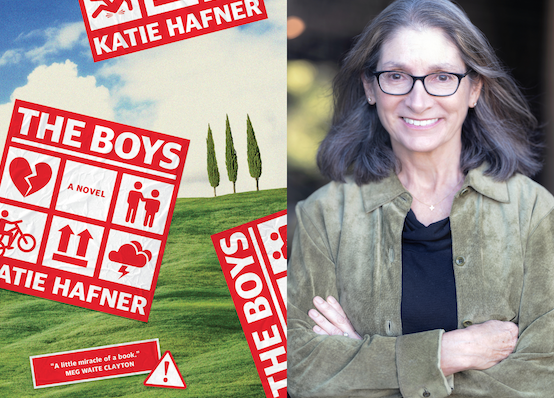
Early on in the pandemic, in the earliest days of the lockdown, we wondered this was going to change the world. Ironically, it was easier to look out and to try and figure out its impact on the world, rather than dig deeper and wonder how it might affect us.
But it did give us time to think, to wonder, and for some, to be deeply creative. It gave us all a springboard to see the familiar in new ways. To cope with isolation in new ways, to reaffirm or reconstruct our most intimate relationships.
All of this has given way to what might become a new genre of the pandemic art form; be it in the service of art, or music, or movies, or novels.
If Katie Hafner's debut novel The Boys is any indication, it will be a great genre.
My conversation with Katie Hafner:
Wednesday Aug 10, 2022
Why Harvey Weinstein Should Matter: A Conversation with Ken Auletta
Wednesday Aug 10, 2022
Wednesday Aug 10, 2022
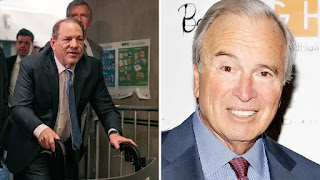 In spite of the supposed transparency of the internet age, more and more we live in the age of complicity. Last month we saw it with the trove of documents and stories that came to light about UBER. Tim Miller’s recent book about Trump's enablers shows how it’s happened repeatedly in the White House, just as Michel Lewis showed us, several years ago, how it happened on Wall Street in the face of the 2008 financial crisis.
In spite of the supposed transparency of the internet age, more and more we live in the age of complicity. Last month we saw it with the trove of documents and stories that came to light about UBER. Tim Miller’s recent book about Trump's enablers shows how it’s happened repeatedly in the White House, just as Michel Lewis showed us, several years ago, how it happened on Wall Street in the face of the 2008 financial crisis.
For 20 years in Hollywood, the complicity around the actions of Harvey Weinstein was airtight.
What is it about Hollywood and Wall Street and politics that encourages and even condones such complicity in bad behavior?
Long-time media journalist Ken Auletta tells the thirty-thousand-foot view in telling the story of Harvey Weinstein, his rise and fall, through the lens of his enablers and his victims in his new book Hollywood Ending: Harvey Weinstein and the Culture of Silence.
My conversation with Ken Auletta:
Wednesday Jul 27, 2022
The Trump Roster of Toadies: A conversation with Mark Leibovich
Wednesday Jul 27, 2022
Wednesday Jul 27, 2022
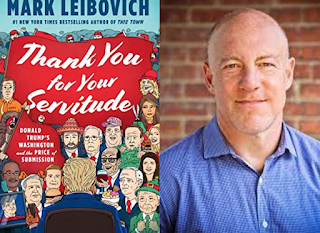 Modern Washington has always offered up an impressive roster of toadies. Yet the Trump administration seems to have offered us a unique period of bowing and scraping.
Modern Washington has always offered up an impressive roster of toadies. Yet the Trump administration seems to have offered us a unique period of bowing and scraping. Monday Jul 18, 2022
Negotiation for Fun and Profit: A Conversation with Rich Cohen
Monday Jul 18, 2022
Monday Jul 18, 2022
As Rich tells his story, it's not Geoffrey or Tobias Wolff seeing their father’s story through the lens of deception, but through a celebration of the power of imagination.
Rich Cohen is the New York Times-bestselling author of Tough Jews, Monsters, Sweet and Low, The Sun & the Moon & the Rolling Stones, The Chicago Cubs, and The Last Pirate of New York. His latest is The Adventures of Herbie Cohen.
My conversation with Rich Cohen:
Monday Jul 04, 2022
Another Love Discourse
Monday Jul 04, 2022
Monday Jul 04, 2022
 Sometimes the world makes little sense. That’s why when the right novel comes along, it helps us to look inward at the things that really shape us, move us and help carry us into tomorrow.
Sometimes the world makes little sense. That’s why when the right novel comes along, it helps us to look inward at the things that really shape us, move us and help carry us into tomorrow.
For a time, amidst the dark days of the pandemic, there was a precariousness about life itself. When we felt more confident of coming out of that, it gave way to an equal uncertainty about our most intimate relationships. It opened a pandora's box, letting out our grief and fear and inadequacies.
This is the stuff of Edie Meidav's new novel Another Love Discourse.
My conversation with Edie Meidav:
Tuesday Jun 28, 2022
Your Dreams Are Not What You Think
Tuesday Jun 28, 2022
Tuesday Jun 28, 2022
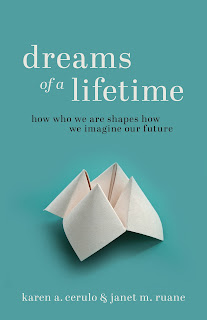 When we talk about our dreams, it's usually in the context of limitless possibilities. It’s the one often private place where we are free from the constraints of reality. Seemingly limited only by our imagination, our dreams often hold the key to how we see our future.
When we talk about our dreams, it's usually in the context of limitless possibilities. It’s the one often private place where we are free from the constraints of reality. Seemingly limited only by our imagination, our dreams often hold the key to how we see our future.
But those dreams have a context. Our life experience, our social position, race, gender and status all shapes those dreams. It’s an interesting irony that the dreams that we think can move us to unlimited possibilities, can often hold us back. Our dreams both shape who we become, as we think we shape them.
We explore this with Karen Cerulo and Janet Ruane in their book Dreams of a Lifetime - How Who We Are Shapes How We Imagine Our Future.
Tuesday Jun 21, 2022
David Gergen on How Great Leaders are Made
Tuesday Jun 21, 2022
Tuesday Jun 21, 2022
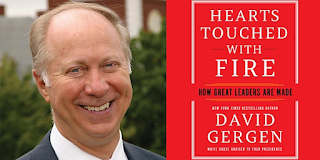 We often look at leadership today as about celebrity or attention. In a time when we have elected a reality show star as President, when celebrity politics is the lifeblood of the American political class, it’s hard to imagine world class a politician or global leader emerging today
We often look at leadership today as about celebrity or attention. In a time when we have elected a reality show star as President, when celebrity politics is the lifeblood of the American political class, it’s hard to imagine world class a politician or global leader emerging todayIt makes you wonder, Is there something in our culture that has become antithetical to leadership? We watch Valdamer Zalinsky in wartime, and we’ve seen the leadership qualities that are possible. We even see it in some of our military leaders…but why the seemingly dearth of political leaders today.
David Gergen, who has devoted more than half a century of public service, and has served as a White House adviser to four US presidents of both parties: Nixon, Ford, Reagan, and Clinton, examines the perils of leadership in his new book Hearts Touched with Fire: How Great Leaders are Made .
Tuesday Jun 07, 2022
Why Anxiety is Good for You!
Tuesday Jun 07, 2022
Tuesday Jun 07, 2022
 It seems we live in a society where everyone wants to be protected. We don’t want to hear views we disagree with for fear that it might upset us, we don't’ want to go back to the office because we get stressed by a commute. We are afraid to let our kids go out and play unless they are supervised. We are anxious about money, about politics, about family…it’s no wonder there is an entire drug industry with provides for our every anxious moment.
It seems we live in a society where everyone wants to be protected. We don’t want to hear views we disagree with for fear that it might upset us, we don't’ want to go back to the office because we get stressed by a commute. We are afraid to let our kids go out and play unless they are supervised. We are anxious about money, about politics, about family…it’s no wonder there is an entire drug industry with provides for our every anxious moment.
We live emerged in first world problems that pale compared to the Greatest Generation, that fought a World War, lived through a Depression and did duck-and-cover drills in fear of nuclear annihilation.
Just maybe the fault is not in our society but in ourselves. Maybe instead of trying to eliminate all that might make us anxious, suppose we just got better at dealing with it. Just Maybe coping has fewer side effects than medication? Maybe that is what we were trained to do, as man first stepped onto the savannah, and the lion came after him. He learned very quickly to cope with anxiety. That coping is still buried somewhere in our DNA
This is where Tracy Dennis-Tiwary takes us in her new book Future Tense - Why Anxiety Is Good for You .
Thursday May 26, 2022
Has Mitch McConnell Destroyed the US Senate?
Thursday May 26, 2022
Thursday May 26, 2022
In our lifetime and in the 246-year history of the republic, there was a time when great men walked astride the United States Senate. It was the crucible of democracy. Once referred to as the greatest deliberative body, and a cooling saucer to modulate the nation's passions, it now fails on all counts.
Today it’s filled with small-minded men and women, whose desire for reelection, money, and partisan advancement over the interests of the people, rules the day. And while there may be more crazies and corruption on one side, the other side has proven itself to be weak freckles and lacking in imagination. All of which makes them just bad at politics.
Certainly, the “how we got here” is a complicated story. There is plenty of blame to go around. However, since 2006, when he became minority leader, Mitch McConnell has sucked dry any moral compass the Senate might have. McConnell's actions during the Obama and Trump presidency may mark the end of the Senate as we know it. Whether it also marks the end of democracy is for today at least, an open question.
That's the question that Senate historian Ira Shapiro takes up in his new look at McConnell Betrayal How Mitch McConnell and the Senate Republicans Abandoned America.
My conversation with Ira Shapiro:
Monday May 23, 2022
Another Way Forward for Democrats
Monday May 23, 2022
Monday May 23, 2022
 Back in 2002 in the wake of the George W. Bush election political demographer Ruy Teixeira, along with journalist John Judas, wrote The Emerging Democratic Majority. It spoke of the changing demographics of America. It looked at ethic diversity and how it was destined to forever shape Democratic success in the 21st century. This has not worked out so well for a multitude of reasons.
Back in 2002 in the wake of the George W. Bush election political demographer Ruy Teixeira, along with journalist John Judas, wrote The Emerging Democratic Majority. It spoke of the changing demographics of America. It looked at ethic diversity and how it was destined to forever shape Democratic success in the 21st century. This has not worked out so well for a multitude of reasons.
It turns out that the feature, not the bug, was the way our constitution was written. Rural voters matter.
Books like Hillbilly Elegy, What’s The Matter with Kansas and Kevin Phillips’ Emerging Republican Majority, painted a different picture than Teixeira and Judas. One where rural votes would succumb to the seduction of populism, culture wars and the power of the evangelical right. Enter Donald Trump and his collection of populist crazies.
But is this a permanent condition? Is this the real 21st century political future? Main State Senator Chloe Maxmin and her campaign manager Canyon Woodward think there is another way forward for the Democratic Party. They detail it in their book Dirt Road Revival.
My conversation with Sen. Chloe Maxmin and Canyon Woodward:
Sunday May 15, 2022
How Wars End: A conversation with Gideon Rose
Sunday May 15, 2022
Sunday May 15, 2022
 Gabriel Garcia Marquez famously said that it’s much easier to start a war than it is to end it. Certainly, we’ve seen this up close and personal in Korea, Vietnam, Iraq, Afghanistan, and even, if we look more closely at the history, both world wars. It’s difficult to lose a war, but just as difficult to win, since winning a war is certainly not the same as winning the peace.
Gabriel Garcia Marquez famously said that it’s much easier to start a war than it is to end it. Certainly, we’ve seen this up close and personal in Korea, Vietnam, Iraq, Afghanistan, and even, if we look more closely at the history, both world wars. It’s difficult to lose a war, but just as difficult to win, since winning a war is certainly not the same as winning the peace.
We see often in the corporate world that the founders of companies may be great at startups, but not so good at running mature companies. War is not that different. Those that start them, that direct them, and sometimes even win them may not be so good at ending them in a way that cements or makes worthwhile any victory. All these are important things to think about in the crucible of Ukraine, because someday this war will also end and whether it will be worth the loss of lives and treasure for the Ukrainian people or for Russia is certainly an open question.
It’s hard to imagine that either side is thinking about that end game at this point, but certainly, they should be according to my guest on the WhoWhatWhy podcast former Foreign Affairs editor and CFR fellow Gideon Rose.
My WhoWhatWhy.org conversation with Gideon Rose:
Friday May 06, 2022
Friday May 06, 2022
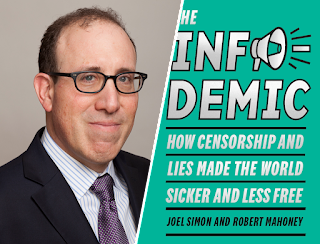 While everyone is busy opining on the unknown and probably minor impact of a change of ownership of Twitter, we have literally ignored the chilling and perhaps long-term impact that the pandemic has had in enhancing government misinformation, curtailing free speech, and giving more powers to government. All while censuring information that actually might have helped people. And not just in China…but in the U.S. and around the world.
While everyone is busy opining on the unknown and probably minor impact of a change of ownership of Twitter, we have literally ignored the chilling and perhaps long-term impact that the pandemic has had in enhancing government misinformation, curtailing free speech, and giving more powers to government. All while censuring information that actually might have helped people. And not just in China…but in the U.S. and around the world.
It was Churchill who originally said, “never let a good crisis go to waste.” Certainly, governments of the world did not. In China, Israel, Brazil, Egypt India, and int the US Covid-19 gave carte balance to leaders to misinform, misdirect and take political advantage.
Joel Simon writes in The Infodemic that throughout the pandemic many people felt as if they were drowning in information, yet in fact, they were being censored.
My conversation with Joel Simon:
Thursday Apr 28, 2022
Thursday Apr 28, 2022
 The metaverse notwithstanding, the nexus between what happens on the internet, and what happens in the real, physical world, is disappearing. The blood-brain barrier between the two has broken. And every day, in our finances, in our interpersonal communications, in our entertainment, in our transportation, and even in what we eat, the connection between our digital world and our real world is further integrated.
The metaverse notwithstanding, the nexus between what happens on the internet, and what happens in the real, physical world, is disappearing. The blood-brain barrier between the two has broken. And every day, in our finances, in our interpersonal communications, in our entertainment, in our transportation, and even in what we eat, the connection between our digital world and our real world is further integrated.
Reactions to this vary from, “I’m terrified of everything; the government should control the internet,” to, “There is no privacy; do I have nothing to hide; and why should I care if I’m being served up greater convenience?” The fact is that vast sums of data on all of us are being collected, sometimes in the name of convenience, sometimes in the name of national security, and it’s unclear exactly what’s going on. It’s unclear where security theater starts, and real security begins.
In short, the cyber world presents 21st-century problems that have not yet been solved, much less, fully understood. We talk about that today with my guest, Bruce Schneier, a public interest technologist working at the intersection of security, technology, and people.
My WhoWhatWhy.org conversation with Bruce Schneier:
Wednesday Apr 27, 2022
A Whistleblower Stands Up To China: A Conversation with Ashley Yablon
Wednesday Apr 27, 2022
Wednesday Apr 27, 2022
 Think about how different the world is because of whistleblowers. Think about the impact of Daniel Ellsberg, Coleen Rowley, Sherron Watkins, Jeffery Weigand, and Karen Silkwood.
Think about how different the world is because of whistleblowers. Think about the impact of Daniel Ellsberg, Coleen Rowley, Sherron Watkins, Jeffery Weigand, and Karen Silkwood.
Each changed the trajectory of a company or a government for the better, and in doing so risked making their own lives so much worse.
So why do they do it? Why do some individuals put their own moral compass ahead of the risks of being a whistleblower?
Ashley Yablon might be able to answer some of these questions because he is a whistleblower. His information would have a profound impact on one of China’s largest technology companies. It would result in large fines for the company, but what impact did it really have, and was it worth what it cost Yablon?
Ashley Yablon joins me to discuss STANDING UP TO CHINA.
My conversation with Ashley Yablon:

